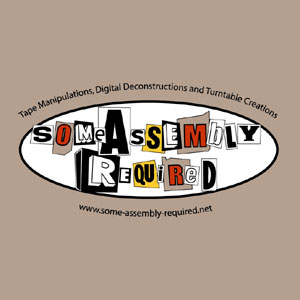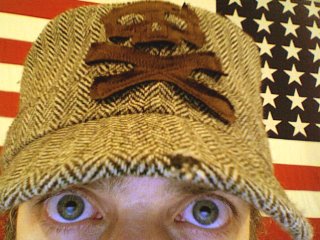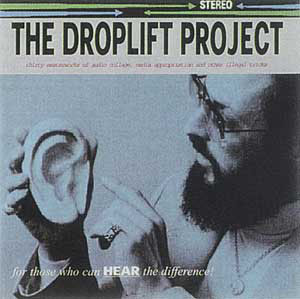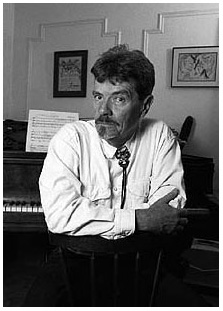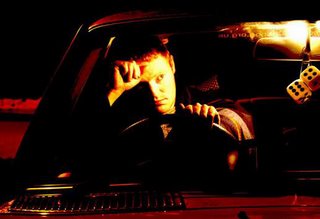 Soundhog is Ben Hayes, from North Wales. He's a mashup artist, though he leans (strongly) towards calling it "bastard pop," and by the sounds of things, at his myspace page, would probably prefer that you didn't talk to him about any of it, at all. Ever. This puts me in a bit of a spot, as I'm actually pretty excited to be presenting his Q&A here, as I'm a fan of his work as a bastard pop artist. Just another star of the genre who has moved on, I guess. Luckily, he's left us with a few gems.
Soundhog is Ben Hayes, from North Wales. He's a mashup artist, though he leans (strongly) towards calling it "bastard pop," and by the sounds of things, at his myspace page, would probably prefer that you didn't talk to him about any of it, at all. Ever. This puts me in a bit of a spot, as I'm actually pretty excited to be presenting his Q&A here, as I'm a fan of his work as a bastard pop artist. Just another star of the genre who has moved on, I guess. Luckily, he's left us with a few gems.His alter-alter ego, by the way, is The Freelance Hairdresser, and his other projects include an online radio program (don't call it a podcast), called Radio Soundhog. He's also a recording artist, in a "electronic experimental supergroup" called Tauchsieder, which put out a CD in 2007.
Without further ado, here's the SAR Q&A with Soundhog...
*Name: Soundhog
*Are there any additional names used to describe this project: Soundhog is the name I use for most of the normal bootlegs, long mixes and remixes. Less 'serious' tracks were done under the 'Freelance Hairdresser' banner (which are the ones that usually got all the attention - pah...) and I've also been part of a project known as "Tauchsieder" with a CD that came out in 2007 (and nobody knew about), but that was original stuff and as such probably outside the scope of this feature. Shame, 'cos it's really good.
*Do you use a pseudonym? Soundhog and Freelance Hairdresser are just me. My friend Stuart Mclean (who used to do bootlegs as 'Frenchbloke') did a couple of early Hairdresser tracks before I grabbed the project with both hands, and was also a member of Tauchsieder.
*Members: Ben Hayes. I used to try and keep an air of mystery about it, but there's not much point these days. Hello.
*Tape manipulations, digital deconstructions or turntable creations: If I had to choose, then the first two (depending on the material - I've done all sorts over the years). I'm a pretty damn good DJ, but I'm not very well versed in the turntablism art - I love my record collection too much to get them covered in fingerprints and wear them out around the first beat. I'm starting to practice though... I've already ruined part of one of my original Bonzo Dog Band albums from continuous back-cueing... dammit... I think I'll go back to CDJs (Cue gasps from a shocked audience).
*Another genre descriptor: Not really. I really, really dislike the term 'm*shups' - I hate the look and sound of the word, plus it's been hijacked by all sorts of talentless idiots in recent times - so bootlegs/bastard-pop will usually do for me.
*Is there a story behind your name? Soundhog was a brand of budget cassette tape that was quite popular in the UK during the 1970's, a product of the EMI company. I happened to have one lying around when I was creating my first tracks of this ilk, and it seemed like a good idea at the time.
*Location: North-East Wales. Lived here all my life. There's virtually no culture when it comes to music around here, so for once the internet was a saving grace. I was also well away from the epicentre of the bootleg 'scene' when it had it's brief moment of glory in the early 2000s, which was a blessing and a curse in equal measures, I suppose.
*What is your creative/artistic background: I was messing about with tape loops and edits in the late '70s when I was about 8 years old, after reading an article by Ron Geesin (Scottish maverick producer and sonic artist - best known for scoring Pink Floyd's Atom Heart Mother and doing the soundtrack from "The Body" with Roger Waters, but that's just one tip of his particular iceberg). In the early '80s I used to make up my own extended and short edits of various tracks, usually using a deftly wielded finger on the pause button of whatever cassette recorder came to hand. I'd combine these techniques with a home-built sampler running on an Atari 800 in the mid 1980s, and there are some very odd tracks lying on various tapes as a result. I produced a few soundtracks for C64 games in the late '80s (and programmed a couple of games as well), and had a brief stab at creating dance music on an Amiga A500 a couple of years later. I had lots of interest from various labels but nothing ever came of it. I got back into music, and specifically bastard-pop, after hearing the first couple of Girls On Top 7"s by chance - six years or so later, I'm still clinging on by my fingertips to the idea that I've got something worthwhile to offer.
*History: Sort of answered above, but there are examples I did of what would come to be termed 'bootlegs' dating back to the early 1990's. The ideas were there, but the quality was poor due to the limits of the stuff I was working with. The first fruits of the Soundhog 'project' came in late 2001.
*Born: Late 1971, and a few miles from where I'm sitting right now. I'm not the oldest person to do this kinda stuff, though. Oh, dearie me no...
*Motivations: Initially for fun, later to try and break out of a stifling and dull 'scene', recently just to prove a point. Or something. I only do something when I feel the creative need to, which is probably why I come up with very little these days. The days when I could sit down and knock out three ideas a night are long gone. When doing Radio Soundhog 6, it was getting to the point where I'd be coming up with 20 seconds of audio in a six hour period - details are very important to me, even though hardly anybody hears them. I shouldn't knock the old bootleg movement so much I suppose, as without it I'd never be known outside my own front door, but it's hard not to these days (although even when I started getting into it, I was shocked by the amount of crap floating about). I get particularly annoyed when people try to say it's got a 'punk' spirit, or that it's subversive in some way. People who say things like that wouldn't know something truly subversive if it punched them in the face and then kicked them in the genitals. There needs to be more of that, if you ask me... I should have known what I was dealing with long ago. Spend days on a perfectly crafted mixtape and nobody cares. Spend 5 minutes slapping an Eminem vocal over an old ragtime piano track and it's all over the world before you can say "what the...?" There's a lesson in there somewhere. I still do the odd thing these days, recently I've been re-editing a few UK psych and progressive tracks from the late '60s, and occasionally I'll take it upon myself to remix a track that I particularly like. Pretty much just for my own amusement... and without the original artist knowing, of course. Old habits die hard.
*Philosophy: I have no idea. When I got into all this, it was a case of "hang on, I've been doing this for years" and it was like some people had finally ‘got it.’ Once I got away from the basic 'stick a vocal over someone else's music' approach, I was able to mix up all sorts of the weird and wonderful music from the last 50 years, and put it into a format that I hoped people could digest and connect to. I want people to hear how good some Peruvian progressive rock from 1970 is, even if the only way to do that is to have it as a 10 second section in a one hour mix just before a Supremes vocal comes in. I don't bash out shoddy 'A+B' stuff to play to 25 people at the local youth centre, or to get mentioned in some obscure newspaper that nobody actually gives a sh** about - unlike the majority of the 'm*sh-up' scene these days. When things get down to their lowest level, the thick mainstream can 'get it', which is fine if you just want to score ego-points by being played on some backwater radio station or being mentioned in the B'diddly-Boing Evening Herald's "Panty-Sh** List,” but it doesn't make for decent music for those who care about such things. It's four years since making 'bootlegs' was in any way revolutionary or interesting. Occasionally I'll still hear something that's fun for five minutes, but the emphasis is on 'occasionally.’ I apply the same standards to all forms of music. If it's good, it's good. If it's crap, it's crap.
*How would you like to be remembered: As a grumpy, opinionated bastard who actually knew what he was doing. I'm a dead nice person in reality, but I've just got no time whatsoever for bullsh** when it comes to music...
*Web address:
www.soundhog.co.uk
www.myspace.com/soundhog
www.myspace.com/thefreelancehairdresser
www.some-assembly-required.net
